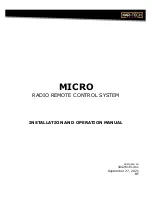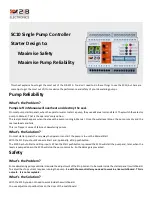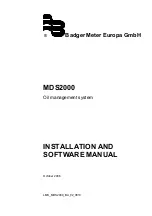
CHAPTER 5: SETTINGS
CONTROL ELEMENTS
L60 LINE PHASE COMPARISON SYSTEM – INSTRUCTION MANUAL
5-299
5
The selector switch element is intended to replace a mechanical selector switch. Typical applications include setting group
control or control of multiple logic sub-circuits in user-programmable logic.
The element provides for two control inputs. The step-up control allows stepping through selector position one step at a
time with each pulse of the control input, such as a user-programmable pushbutton. The three-bit control input allows
setting the selector to the position defined by a three-bit word.
The element allows pre-selecting a new position without applying it. The pre-selected position gets applied either after
time-out or upon acknowledgement via separate inputs (user setting). The selector position is stored in non-volatile
memory. Upon power-up, either the previous position is restored or the relay synchronizes to the current three-bit word
(user setting). Basic alarm functionality alerts the user under abnormal conditions; for example, the three-bit control input
being out of range.
A selector switch runs every two power cycles.
SELECTOR 1 FULL RANGE
— This setting defines the upper position of the selector. When stepping up through available
positions of the selector, the upper position wraps up to the lower position (position 1). When using a direct three-bit control
word for programming the selector to a desired position, the change would take place only if the control word is within the
range of 1 to the
SELECTOR FULL RANGE
. If the control word is outside the range, an alarm is established by setting the
SELECTOR ALARM
FlexLogic operand for three seconds.
SELECTOR 1 TIME-OUT
— This setting defines the time-out period for the selector. This value is used by the relay in the
following two ways. When the
SELECTOR STEP-UP MODE
is “Time-out,” the setting specifies the required period of inactivity
of the control input after which the pre-selected position is automatically applied. When the
SELECTOR STEP-UP MODE
is
“Acknowledge,” the setting specifies the period of time for the acknowledging input to appear. The timer is re-started by
any activity of the control input. The acknowledging input must come before the
SELECTOR 1 TIME-OUT
timer expires;
otherwise, the change does not take place and an alarm is set.
SELECTOR 1 STEP-UP
— This setting specifies a control input for the selector switch. The switch is shifted to a new position at
each rising edge of this signal. The position changes incrementally, wrapping up from the last (
SELECTOR 1 FULL RANGE
) to
the first (position 1). Consecutive pulses of this control operand must not occur faster than every 50 ms. After each rising
edge of the assigned operand, the time-out timer is restarted and the SELECTOR SWITCH 1: POS Z CHNG INITIATED target
message is displayed, where Z the pre-selected position. The message is displayed for the time specified by the
FLASH
MESSAGE TIME
setting. The pre-selected position is applied after the selector times out (“Time-out” mode), or when the
SELECTOR 1 STEP-UP:
Off
Range: FlexLogic operand
SELECTOR 1 STEP-UP
MODE: Time-out
Range: Time-out, Acknowledge
SELECTOR 1 ACK:
Off
Range: FlexLogic operand
SELECTOR 1 3BIT A0:
Off
Range: FlexLogic operand
SELECTOR 1 3BIT A1:
Off
Range: FlexLogic operand
SELECTOR 1 3BIT A2:
Off
Range: FlexLogic operand
SELECTOR 1 3BIT
MODE: Time-out
Range: Time-out, Acknowledge
SELECTOR 1 3BIT ACK:
Off
Range: FlexLogic operand
SELECTOR 1 POWER-UP
MODE: Restore
Range: Restore, Synchronize, Sync/Restore
SELECTOR 1 TARGETS:
Self-reset
Range: Self-reset, Latched, Disabled
SELECTOR 1 EVENTS:
Disabled
Range: Disabled, Enabled
















































